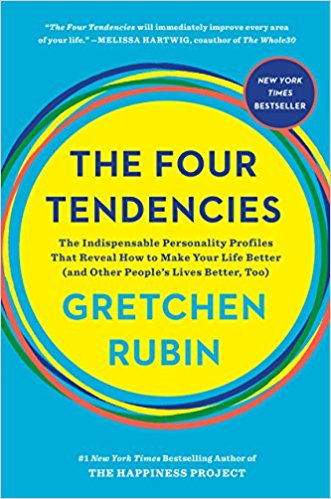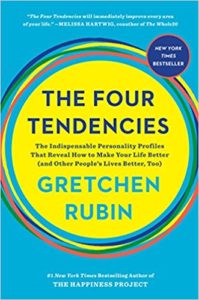At work, we are often trying to satisfy a bundle of expectations, which can be boiled down to those expectations we place upon ourselves and those placed by others. In government, of course, those outer expectations can be powerful, handed down from the public, the minister, and our immediate boss.
But we all react differently, weighing those expectations not just by the specific issue but more generally by our personality disposition. Understanding that personality tangle can help us to understand ourselves and how to deal better with colleagues.
The Four Tendencies
By Gretchen Rubin
Harmony Books, 257 pages, $32.00
For that, Gretchen Rubin’s The Four Tendencies can be indispensable. The four tendencies as she outlines them in her book are:
- Upholders respond readily to both outer and inner expectations.
- Questioners question all expectations; they meet an expectation only if they feel it’s justified, so in effect, they respond only to inner expectations.
- Obligers respond readily to outer expectations but struggle to meet inner expectations.
- Rebels resist all expectations, outer and inner alike.
“Our Tendencies are hardwired: They’re not the result of birth order, parenting style, religious upbringing, gender. They’re not tied to extroversion or introversion. They don’t change depending on whether we’re at home, at work, with friends. And they don’t change as we age. We bring these Tendencies into the world with us,” she writes.
People often assume they are a mixture of the tendencies. But she says to a degree that even surprises her, most people fall squarely into one of the four camps. But history and circumstances can play an influence. It’s unlikely you would be a Questioner in North Korea. To the extent your office resembles North Korea, that may mean you are different at work from outside work.
To identify your Tendency, you must consider many examples of your behaviour, as well as the reasons for those behaviours. As an example, both a Questioner and a Rebel might reject an expectation, but their thinking sets them apart. The Questioner feels: “I won’t do it because it doesn’t make sense.” On the other hand, the Rebel would be thinking: “I won’t do it because you can’t tell me what to do.”
Her study has shown that people feel that the Obliger and the Rebel tendencies are the most challenging, whether from feeling such a Tendency or from dealing with them. “I sometimes get the impression that people try to figure out the ‘best’ Tendency and shoehorn themselves into it. But there’s no best or worst Tendency. The happiest, healthiest, most productive people aren’t those from a particular Tendency, but rather they’re the people who have figured out how to harness the strengths of their Tendency, counteract the weaknesses, and build the lives that work for them,” she notes.
Recognizing your own Tendency can help you tweak situations to increase your odds of success. It’s unlikely you can change your own nature, but you can change the situation to suit your Tendency and thrive, by such things as striving for more clarity, justification, accountability or freedom.
“On the flip side, when we understand others’ Tendencies, we’re more tolerant of them. For one thing, we see that a person’s behaviour isn’t aimed at us personally,” she adds.
She argues that knowing somebody’s Tendency makes it easier to encourage or persuade them, while avoiding conflict. If you ignore the Tendencies, you may be sinking your chances. If you are an Upholder and keep lecturing a Rebel, that person will only increase their desire to resist. If you’re a Questioner, you probably try to explain everything rationally when giving directions, but an Obliger will follow directions without question and those logical reasons aren’t needed.
Her book offers 12 questions to determine your Tendency. Here are three:
- Have you kept a New Year’s resolution where you weren’t accountable to anyone?
- Yes, I’m good at keeping New Year’s resolutions, even the ones no one knows about but me.
- I’m good at keeping resolutions, but I make them whenever the time seems right. I wouldn’t wait for the New Year; January 1 is an arbitrary date.
- I have trouble with that kind of resolution, so I’m not inclined to make one; when I’m only helping myself, I struggle.
- No, I hate to bind myself in any way.
- At times we feel frustrated with ourselves. Are you most likely to feel frustrated because…
- My constant need for more information exhausts me.
- As soon as I’m expected to do something, I don’t want to do it.
- I can take time for other people, but I can’t take time for myself.
- I can’t take a break from my usual habits, or violate the rules, even when I want to.
- Which description suits you best?
- Puts others – family, friends, and co-workers – first.
- Disciplined – sometimes even when it doesn’t make sense.
- Refuses to be bossed by others.
- Asks necessary questions.
For question one, your responses indicate, from a to d, that you are an Upholder, Questioner, Obliger, or Rebel. For the second question, in order: Questioner, Rebel, Obliger, Upholder. And for the third: Obliger, Upholder, Rebel, or Questioner.
Upholders tend to be self-starters, self-motivated, conscientious, reliable and thorough. Weaknesses include defensiveness; rigidity; often struggles when plans or schedules change; and is impatient when others need reminders, deadlines, supervision or discussion. Upholders can make great colleagues and also great bosses because they are clear about setting expectations and highly disciplined themselves. However, they can have trouble delegating, as they assume others won’t do a good job. Because of their desire to meet both inner and outer expectations, they can be reluctant to pitch in to help others if it means setting aside their own obligations.
Questioners are data-driven, interested in creating systems that are efficient and effective, are comfortable bucking the system if it’s warranted, and quite willing to play devil’s advocate. They love research and reject easy explanations like, “This is the way we have always done it.” As you can imagine, even if you’re a Questioner, the relentless questioning is often not appreciated by bosses or colleagues. “Coworkers can help them avoid over-questioning by putting limits on their investigations. For instance, a manager might tell a Questioner who’s is interviewing people for a new hire to decide by a certain date or consider only the top five candidates. Limitation helps force actions,” she says. She also points out that because questioners have great faith in their own analysis and judgment, they can become convinced of their rightness of their views and refuse to be persuaded otherwise.
Obligers are responsible and willing to go the extra mile. They can be a good boss, responsive leader, and a strong team player. Weaknesses include being exploitable, susceptible to overwork and burnout, and may become resentful of always acting for others. Indeed, because they place such a high value on meeting outer expectations, others can take advantage of them, leading to Obliger-rebellion, which is tough for colleagues to handle. To avoid that, remind Obligers that saying no allows them to say yes to more important work. Enforce limits to help avoid rebellion and burnout. Take work away from the Obliger if the individual has taken on too much.
Rebels are independent-minded, able to think outside the box, and unswayed by conventional wisdom. They can be uncooperative, inconsiderate, restless and unable to accomplish tasks that need to be done consistently the same way each time. Many Rebels respond well to a challenge or a date and can thrive in a workplace where they can do their work their own way. They generally don’t take orders well from others but can work well with others when they are the leader. She says at work you should provide information, present possible consequences, and allow them to choose how to act, which may not work all that well in government, of course.
And that can be the point. It’s helpful to know your own style, and those of colleagues, particularly when hiring future colleagues. Certain Tendencies may better fit government executives, so study yourself and others to smooth the way.


